“If there is a large, immovable rock-like challenge in my path, I would choose to behave like water and navigate my way around it to my destination. As entrepreneurs, women need to know where they have to stand like a rock and where they have to be flexible like water.”
Rajul Patkar
Co-founder, Proximal SoilSens
https://www.soilsens.com/company/team.html
Ditty Maria Dominic and Bhuvana N recently conversed with Rajul Patkar, one of the co-founders of Proximal SoilSens. Their conversation delved into Rajul’s entrepreneurial journey that was driven by a mission to make a meaningful impact in the agricultural sector through technology. Here are some highlights from the interview.
| SoilSens© empowers farmers by providing them with an integrated platform solution to understand their soil better and apply water, fertilizer, and pesticides precisely to optimize input costs and crop productivity. Technologies innovation started at IIT Bombay and continued at Proximal SoilSens. Soilsens’s vision is to make technology accessible to every farmer regardless of their farm size. They have built indigenous technologies focusing on ‘Made in India, Made for World’. In its multiple deployments, SoilSens has proven that its technologies are robust, affordable, accurate, and beneficial for farmers to improve yield and overall income and save the environment. Currently, the world’s smallest soil testing device, Nutrisens, is making waves and has reached the global market quickly. |
Can you provide a brief overview of your personal and professional background?
I come from a conservative community where women’s education was not actively encouraged, especially in technical fields. Although I was born in Indore I was raised in Andhra Pradesh due to my father’s job. Fortunately, my parents held progressive views and wholeheartedly supported my pursuit of higher education. Growing up in the southern region of India allowed me to nurture my academic ambitions instead of conforming to the prevalent trend of early marriages among girls in my community.
In contrast to most girls who opted for arts or commerce, I had a clear vision – I wanted to pursue a technical education and contribute meaningfully to society. My unconventional nature was evident from an early age, and my dream was to become an engineer. I pursued my BTech degree from Andhra University. Upon graduating, I aspired to move to a city where I could find more opportunities. Although my family was initially skeptical and unsupportive of this decision, I was determined to construct my own path and explore uncharted territory. So, I convinced my family and relocated to Mumbai, where my aunt lived. While in Mumbai, I succeeded in the GATE exam and gained admission to an MTech program at one of India’s prestigious institutions, the Indian Institute of Technology Bombay (IIT-Bombay).
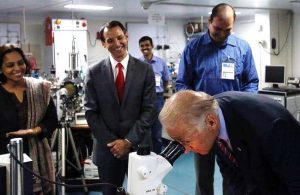 Mr. Joe Biden, President of the USA (then Vice President) looking at one of the devices fabricated by Dr. Rajul as part of her PhD on his visit to IIT Bombay, 2013
Mr. Joe Biden, President of the USA (then Vice President) looking at one of the devices fabricated by Dr. Rajul as part of her PhD on his visit to IIT Bombay, 2013
My journey at IIT was marked by substantial growth. I engaged in a project supported by the Ministry of Human Resource Development (MHRD), now known as the Ministry of Electronics and Information Technology (MeitY). In this project, I designed an affordable hardware solution – a Field Programmable Gate Arrays (FPGAs) Evaluation Board – to assist engineering college instructors. My motivation for this project stemmed from the realization that many educational institutions lacked access to such expensive equipment. Subsequently, I successfully transferred this technology to a computer manufacturer, providing these boards to various engineering institutions.
This period of innovation and impact solidified my entrepreneurial inclination and unwavering desire to contribute positively to society. In 1996, I completed my master’s degree and embarked on a professional career, gaining varied experience across various organizations. However, my passion for entrepreneurship and my commitment to giving back to society never wavered. Driven by this vision, I took a significant step in 2011, enrolling in a PhD program at IIT-Bombay after a 16-year academic gap. This decision marked a pivotal moment in my personal and professional growth, reinforcing my dedication to create lasting societal impact.
Could you share the story of your transition from academia to entrepreneurship?
My journey from academia to entrepreneurship began with a clear and unwavering commitment: I refused to let my PhD thesis gather dust on the IIT-Bombay library shelves. Instead, I was resolute in my desire to make a real impact with my research. Early on, it became evident to me that the domains of health and agriculture held immense promise for driving meaningful change. What spurred me further was the stark realization that within my academic cohort, there were few, if any, venturing into the realm of sensors for agriculture. This, coupled with the distressing news reports highlighting the plight of farmers, I found my calling in the agricultural sector.
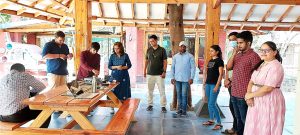 The SoilSens team cultivating ideas in their office at Pune
The SoilSens team cultivating ideas in their office at Pune
Although I lacked a formal background in agriculture, I was undeterred. To bridge this knowledge gap, I embarked on a journey of exploration and education. I traversed the length and breadth of India, visiting prestigious institutions such as the Indian Agricultural Research Institute (IARI), the International Rice Research Institute (IRRI), and the Professor Jayashankar Telangana State Agricultural University (PJTSAU). These visits allowed me to forge connections with seasoned experts in the field, immersing myself in the intricacies and challenges of agriculture.
The pivotal moment arrived when we secured funding from the Department of Science and Technology (DST) and MeitY. These projects were dedicated to developing cutting-edge moisture and nutrient sensors explicitly tailored to the agriculture sector. It was then that my academic pursuits seamlessly melded with entrepreneurship.
In retrospect, my journey underscores the profound impact of determination, networking, and an solid desire to create positive change. It serves as a testament to the notion that one’s background should never limit the pursuit of transformative innovations. As I continue on this path, my commitment remains unwavering – to leverage technology to improve agriculture, ensuring our efforts leave an enduring and impactful mark on the world.
How did you manage the dual responsibilities of pursuing a PhD while simultaneously building your enterprise?
I had a clear vision that the outcome of my doctoral research should yield a practical product benefiting farmers. In academia, there’s often a strong emphasis on publishing research papers, a demanding task that consumes a substantial amount of time. To navigate this challenge, I pursued two distinct endeavors: one focused on my PhD and the other dedicated to my entrepreneurial venture.
In my academic pursuit, I published research papers and secured a patent for a product I developed as a part of my research work. However, it became evident that this product would require additional time to fully mature before being introduced into the market. This realization prompted me to embark on a parallel journey to create a product for my entrepreneurial venture. This product would be cost-effective and user-friendly, catering specifically to the needs of our farming community.
Have you participated in any incubation programs?
Our journey into incubation wasn’t immediate. In the early stages of building my company, I didn’t recognize the need for incubation. While I was well-versed in technology, I lacked crucial insights into entrepreneurship. As a result, I made numerous mistakes and soon realized the value of being part of the right incubator.
Affiliated with IIT-Bombay, I was aware of their incubator, the Society for Innovation and Entrepreneurship (SINE). Since SINE primarily focused on technology rather than agriculture, I didn’t formally incubate there. However, I did seek their guidance whenever I encountered challenges. We also had the privilege of winning a 3-lakh rupee prize in an innovation competition organized by SINE.
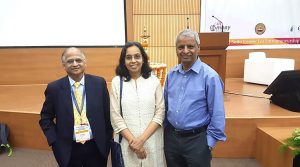 Meeting with Gururaj Deshpande, renowned venture capitalist and Professor Kusre, IIT Bombay
Meeting with Gururaj Deshpande, renowned venture capitalist and Professor Kusre, IIT Bombay
In my experience, I’ve come to appreciate that startups often need accelerators more than traditional incubators. The real key is finding incubators that can offer practical, experience-based advice tailored to the unique needs of each incubatee. Some incubators provide theoretical guidance readily available in books, but entrepreneurs like me require real-world insights from individuals with hands-on experience in entrepreneurship and related fields. The knowledge gained in a typical six-month program can be condensed into just one day when such mentorship is available.
Participating in an incubation program goes beyond education – it’s about building a network and becoming part of a larger ecosystem. Every WhatsApp group within an incubator network has played a role in our journey, offering valuable support and guidance. I’ve had the privilege of being incubated under DST NIDHI’s Promoting and Accelerating Young and Aspiring Technology Entrepreneurs (PRAYAS) program and at Venture Centre, Pune. Although I couldn’t complete the PJTSAU AgHub incubation due to the challenges posed by COVID-19, Dr Kalpana Sastry, the Managing Director of AgHub, has been a steadfast mentor. Additionally, I’ve attended programs in various institutions, including the Research and Innovation Circle of Hyderabad (RICH), Indigram Labs, and Millenium Alliance, all of which have contributed significantly to our growth and success.
Please describe the range of products your company offers.
Our journey began with developing a moisture sensor, a technology that would go on to lay the foundation for our commitment to revolutionizing agriculture. The moisture sensor was the first step in our mission to empower farmers with innovative tools for more efficient farming. Our second product – an IoT system for irrigation management – harnessed various sensor measures, including soil moisture, temperature, and humidity. This system operates on solar power and can be used in open fields, greenhouses, and polyhouses. While our IoT system was significantly more affordable than imported alternatives, real-world field testing revealed a challenge, small farmers found it difficult to bear the cost.
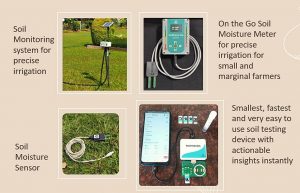 Diverse SoilSens solutions
Diverse SoilSens solutions
In our pursuit to create meaningful impact, we embarked on a journey to design something portable and cost-effective, accessible to all. The result was a smaller, more affordable version of our IoT system, about the size of a dongle (4-5 cm), which could be easily shared among farmers. When a group of 10-15 farmers pooled resources to purchase this product, they gained the ability to map moisture levels in their fields, facilitating better irrigation planning. This initiative caught the attention of the United Nations Development Programme (UNDP), which recognized our product as ‘farmer-friendly’. We’re committed to making technology accessible to all, ensuring that even small farmers can benefit from the digital agricultural revolution. At Proximal SoilSens, our innovations are driven by our dedication to empowering farmers and driving positive change in the farming community.
Then, we developed a soil-testing device called NutriSens, a groundbreaking device that is now the star product in our portfolio. NutriSens represents a leap forward in the world of soil testing technology, offering innovative solutions to address the challenges current soil testing methods face. What sets NutriSens apart is its remarkable design – it’s one of the world’s smallest soil testing devices. Gone are the days of bulky, infrastructure-dependent equipment. NutriSens is incredibly portable and remarkably easy to use, revolutionizing the way soil testing is done.
One of the most significant advantages of our NutriSens soil testing device is the dramatically reduced testing time. Traditionally, farmers would send soil samples to a lab and wait for results, which could take up to 15 days. With NutriSens, that wait time is slashed to just 10 minutes, providing farmers with immediate insights into their soil’s health. Our device measures six critical soil parameters, and we’re continually expanding its capabilities by adding more parameters. We firmly believe that NutriSens will revolutionize soil management, much like how the glucometer transformed diabetes management. In addition to NutriSens, we’re proud to offer the SoilSens Weather Station, which captures real-time weather data so as to empower farmers further with essential information for their agricultural decisions.
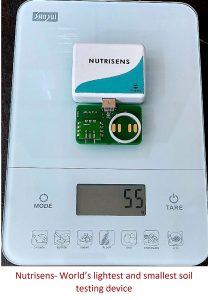 How does the soil testing device, NutriSens, work?
How does the soil testing device, NutriSens, work?
We’ve integrated our soil testing device, NutriSens, with our mobile applications to provide farmers with a powerful on-field solution. When farmers are out in the fields, they can easily create a soil solution and apply it to the paper-based sensor strip within the device. The magic happens as the device runs the test in real-time, generating results for six essential soil parameters. But we don’t stop there. The actual value comes when we present these results as a ‘health card’ in PDF format. This digital report includes the measured parameters, actionable insights, and best agricultural practices tailored to the specific soil condition and crop grown. Being mindful of sustainability we provide only soft copies of these health cards. We’ve also designed our sensors to be paper-based (if required), ensuring eco-friendliness at every step. Sharing these health cards is a breeze. Farmers can easily send them via WhatsApp or any other application, or even take printouts if needed.
Behind the scenes, we collaborate with private agricultural consultants who curate a vast database of advisories. This is where the magic of local expertise comes into play. When our technology is taken to a new location, we work closely with local experts. They input advisories for various crop and soil types, which then automatically get generated based on the specific soil test results.
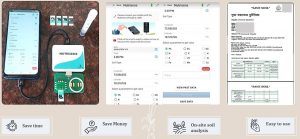 Working of Nutrisens©
Working of Nutrisens©
Currently, we’re making waves in Uttar Pradesh, Jharkhand, and Odisha, thanks to partnerships with esteemed clients – TATA Trust and Collectives for Integrated Livelihood Initiatives (CInI). Together, we’re bringing the power of technology to agriculture, making farming more efficient, informed, and sustainable.
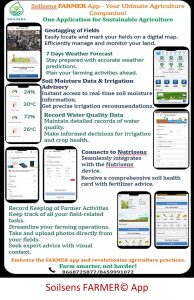 How do you view the transformative potential of digital technologies in the agriculture sector?
How do you view the transformative potential of digital technologies in the agriculture sector?
At Proximal SoilSens, we believe in the tremendous potential of digital technologies to transform the agricultural sector. Beyond our sensor-based products, we’ve harnessed the power of digital innovation to offer a comprehensive suite of solutions. Our portfolio includes two mobile applications: the FARMER© App for farmers, and PROFIT© (Professional Resource for Optimizing Farming, Innovation, and Technology) for agriculture experts, along with the web-based CropWise application. Our web-based app bridges the gap between our valued client, and their network of 1000 farmers.
With our CropWise© app, one can remotely monitor all the farms, access sensor data, and gain real-time insights into on-field activities, no matter where you’re located. The digital advantage empowers you to make informed decisions and optimize farming operations. With regard to farmers, our geotagging feature allows them to track and manage their farms effortlessly. They can log daily activities, which then helps them to create a valuable record of their work. This data not only aids farmers in maintaining better records but also allows customers to track their activities closely, thereby facilitating more informed actions in the future.
We understand that not all farmers may be tech savvy, so we’ve adopted a phase-wise approach to app deployment. At present we’re in the first phase, focusing on raising awareness among farmers and ensuring they feel confident with using the app. We’re more than just a hardware company; we’re dedicated to providing a complete, integrated solution that combines the power of both hardware and software. At Proximal SoilSens, we’re committed to driving positive change in agriculture through the digital revolution.
Did you avail of any financial support or grants?
Securing funding is our overriding challenge, especially because we are a deep tech company, and cannot be compared to the more traditional agribusiness enterprises. It entails substantial financial investments, from developing groundbreaking products to validating them, conducting pilot programs, and marketing our innovations. It is an intricate process where every step requires a significant allocation of resources.
As a domain primarily driven by government initiatives, soil testing presents unique challenges. Given the intricacies of this landscape, even larger corporations find it challenging to engage effectively with small-scale farmers. Despite rigorously testing and validating our products against industry standards, farmers and academic institutions often request formal certifications to endorse the technology. Achieving validations at a larger scale is a resource-intensive endeavor.
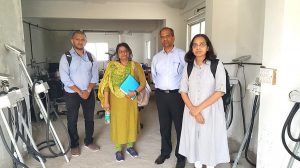 Meeting with BIRAC-DBT team
Meeting with BIRAC-DBT team
One of the most pronounced hurdles is the bureaucratic paperwork called for to access financial support. This cumbersome process not only prolongs the acquisition of funds but can also hinder our ability to meet critical project milestones. Additionally, when dealing with government funds, there is a notable limitation in the allocation of resources. While the funds may be granted, a substantial portion is often earmarked for specific purposes, leaving limited flexibility, particularly when hiring essential human resources.
In essence, the financial landscape poses multiple challenges for us. It underscores the necessity to secure funding and allocate it efficiently to develop world-class products, including the critical investment in human resources. To ensure a steady cash flow, I adopted a few strategies. First, I maintained a lean business model, hiring only passionate and dedicated individuals. Second, I took on a second formal job, working around 16 to 17 hours a day, combining my startup efforts with a reliable and steady source of income. This approach reduced my dependence on the startup for personal finances.
Furthermore, I diversified my product focus, not relying solely on one offering. While I had confidence in the soil testing device, I concurrently developed moisture sensors and small IoT-based systems, mitigating the risk of a single product failure. Funding from BIRAC, Atal Innovation Mission, Millenium Alliance, and DST Nidhi Prayas supported the various technological developments and enhancements. With all our products patented, revenue from the alternative products sustained us until the soil testing device was fully developed.
What is your marketing strategy, and could you tell us about your customer base?
Our journey to successful marketing has been truly exceptional. We’ve achieved remarkable results with a minimal marketing budget, and a commitment to efficient customer acquisition. The secret to our success has been one-on-one networking, forming personal connections that have brought in the majority of our valued customers.
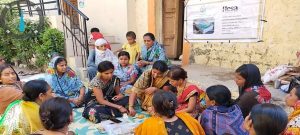 Women SHG members at Solapur, Pune getting acquainted with Soilsens solutions
Women SHG members at Solapur, Pune getting acquainted with Soilsens solutions
We’re proud to have over 20 B2B clients, including industry giants such as ITC, TATA Trust, and Mahindra. Our strong partnerships with these prominent companies are poised to yield even more impressive results in the coming months. But we’re not limiting our horizons to just one region. Our reach extends globally, and our dedicated team actively engages with potential clients in Indonesia, Mozambique, Tanzania, and Guatemala. We’re on a mission to share our innovative solutions and expertise with farming communities worldwide.
In recent months, we’ve also expanded our horizons by collaborating with NGOs and Farmer Producer Organizations (FPOs). We’ve recognized the need to strengthen our presence in this sector, so we’ve welcomed a new marketing professional onto our team. This expert is actively in the field, building connections and forging partnerships with NGOs and FPOs. Together, we’re working towards making a substantial impact and transforming the future of agriculture – one partnership at a time.
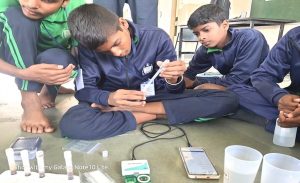 Students from Deep Griha Academy, Pune testing soil using Soilsens technology
Students from Deep Griha Academy, Pune testing soil using Soilsens technology
We are also trying out a new marketing strategy involving school students in rural areas. Convincing farmers is tough because they are always apprehensive about adopting new technology. Therefore, we are introducing our technology to school children so they can discuss our device with their parents and persuade them. This approach is feasible, primarily because our device is exceptionally user-friendly, even for schoolchildren. Additionally, it serves a second purpose, of familiarizing school children – the future generation of farmers – with technology, making them less hesitant to embrace it.
What is the rationale behind your collaboration with FPOs and NGOs?
We are the winners of Social Alpha Krishi Mangal’s 2.0 Cohort, and with that fund we are trying to collaborate with NGOs and FPOs. We are aiming for two things: One, to build a network of agripreneurs who are FPO members; and two, to provide services in rural areas. These agripreneurs can provide soil testing as a service by using NutriSens and earn additional income. So, we are exploring them as potential soil testing partners. We have collaborated with a few NGOs and FPOs in Maharashtra and Gujarat. Individual farmers are not our main customers, as it will not be feasible for individual farmers to invest in a device that will be used only once or twice in a cropping season. Hence, we are trying to market our products to FPOs, NGOs, or agripreneurs. We are also exploring FPOs and NGOs as our implementation partners.
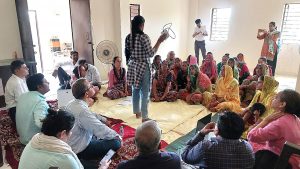 A woman agripreneur demonstrating Soilsens technology to women farmers from Gujarat
A woman agripreneur demonstrating Soilsens technology to women farmers from Gujarat
Have you established any collaborations with public-sector agriculture departments or institutions?
We have pitched our product to the UP government and the deal is yet to be finalised. We also demonstrated the soil testing device at the central government level, and as directed by them, we are validating the soil testing device. We have also spoken to some ICAR and international institutes, like IRRI, for collaborations. Many of these partnerships with the public sector are in the pipeline.
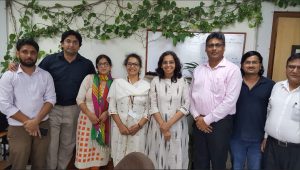 Meeting with officials from the Ministry of Electronics and Information Technology
Meeting with officials from the Ministry of Electronics and Information Technology
What are the future initiatives or goals that SoilSens has in mind?
We have many products in the pipeline for launch, such as Portable Chlorophyll meter, Portable pH meter, Portable NPK meter, Portable TDR Soil Moisture Meter, etc. On the technology side, we plan to launch these products and add more features to our already established products. Collaboration with both the public and private sectors is something we look forward to.
Are there any policy-level changes you would like to see implemented?
I believe that our policies are well-formulated, but the primary issue often lies in their implementation. However, I think there is room for some policy-level adjustments. For instance, many funding schemes and grants have age restrictions. This can pose challenges for female entrepreneurs like me, who started their ventures later in life. Unlike men, many women face a heavier burden of family responsibilities and professional workloads in their younger years. Therefore, it would be beneficial to either remove or raise the age limits for women in these funding support schemes. The aim should be to ensure that financial support is accessible to all entrepreneurs, regardless of age.
Another aspect that greatly concerns me is the potential for policy support to be misused when it appears that a business is owned by women, when in reality, it is being operated by men. There should be some mechanism to understand and verify the contribution of women in an enterprise before providing them with the support earmarked for women entrepreneurs. If a woman entrepreneur is leading that organization and is holding 60 to 70 percent of the business, then she should be given priority.
Furthermore, as to funding, it is imperative to augment the budget allocated for human resources. Establishing a mechanism connecting entrepreneurs with local public organizations or institutions is crucial to ensure they receive essential support for their endeavors, including research and marketing. The presence of a robust policy in this regard will foster collaboration between entrepreneurs and public sector entities.
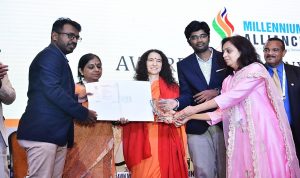 Receiving Millenium Alliance award in 2022
Receiving Millenium Alliance award in 2022
What would be your message or advice to fellow women entrepreneurs?
In the world of entrepreneurship, two invaluable principles have been my guiding stars: building robust networks and embracing the power deriving from seeking help. These behaviors have proven to be more than just strategies; they are essential virtues every entrepreneur should nurture. Connect with people, forge strong networks, and don’t hesitate to reach out when you need assistance. This approach has been a game-changer, opening doors and opportunities I could never have achieved on my own.
In the early phases of your entrepreneurial journey, having a reliable source of income outside your venture is crucial. I firmly believe that entrepreneurs, even with boundless passion, should not hastily abandon alternate means of financial stability. Something should keep trickling in, ensuring your survival. After all, your survival is the foundation of your startup’s success.
Be ready for disappointments and setbacks along the way, they are the footnotes in the story of success. Stay resolute in your vision, don’t be deterred by objections or naysayers. If your purpose is clear and your intentions are noble, forge ahead with unwavering determination. Remember that our efforts hold immense value even if we impact just one percent of the nation’s farmers through our enterprise.
Lastly, never chase money as an end in itself. Focus on doing exceptional work that creates a positive social impact. When you genuinely make a difference, rest assured that money will naturally follow in the wake of your meaningful endeavors.
Acknowledgement: This interview was done as part of the IRRI-CRISP ongoing project ‘Mapping of Good Practices in Digital Innovations in India Supporting Women Agrientrepreneurs’.
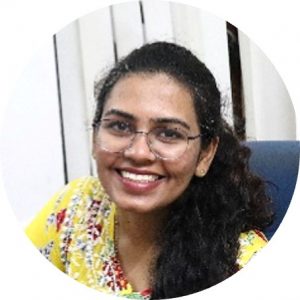 Ditty Maria Dominic, Research Fellow at Centre for Research on Innovation and Science Policy (CRISP), Hyderabad, Telangana, India. She can be reached at: ditty794@gmail.com
Ditty Maria Dominic, Research Fellow at Centre for Research on Innovation and Science Policy (CRISP), Hyderabad, Telangana, India. She can be reached at: ditty794@gmail.com
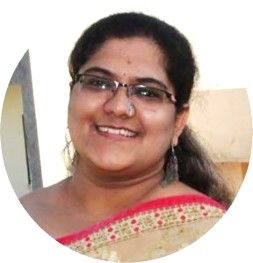 Bhuvana N, is a Consultant at the Centre for Research on Innovation and Science Policy (CRISP), Hyderabad. She has a PhD in Agricultural Extension, from Professor Jayashankar Telangana State Agricultural University, Hyderabad. Her research interests include organizational ecosystems and effectiveness, social networks and technological change. She can be reached at: bhuvanaditya7@gmail.com
Bhuvana N, is a Consultant at the Centre for Research on Innovation and Science Policy (CRISP), Hyderabad. She has a PhD in Agricultural Extension, from Professor Jayashankar Telangana State Agricultural University, Hyderabad. Her research interests include organizational ecosystems and effectiveness, social networks and technological change. She can be reached at: bhuvanaditya7@gmail.com

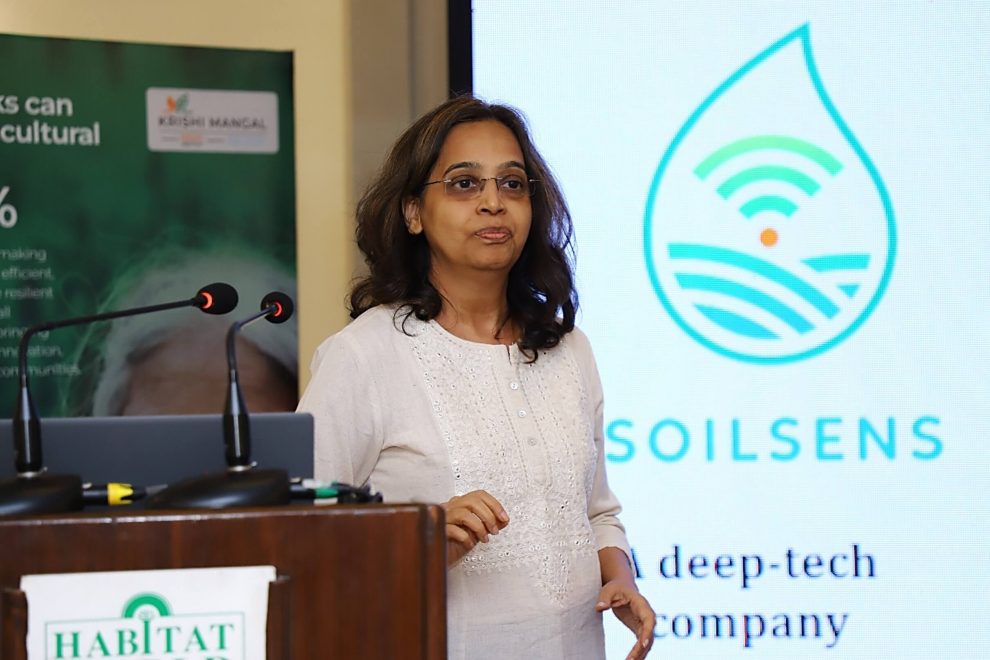

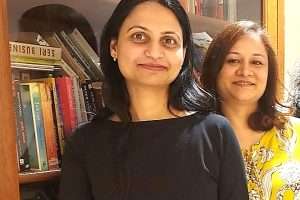

Add Comment